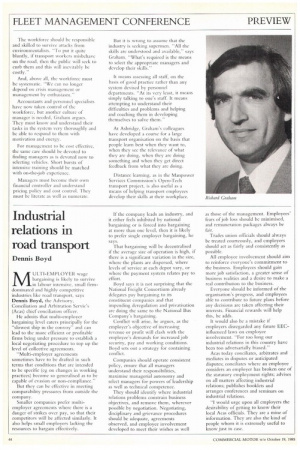Industrial relations in road transport
Page 46

If you've noticed an error in this article please click here to report it so we can fix it.
Dennis Boyd
AiULTI-EMPLOYER wage bargaining is likely to survive in labour intensive, small firmdominated and highly competitive industries like road transport, says Dennis Boyd, the Advisory, Conciliation and Arbitration Servic's (Acas) chief conciliation officer.
He admits that multi-employer bargaining level caters principally for the "slowest ship in the convoy" and can lead to the more efficient or profitable firms being under pressure to establish a local negotiating procedure to top up the level of collective agreements.
"Multi-employer agreements sometimes have to be drafted in such terms that conditions that are intended to be specific (eg on changes in working practices) become so generalised as to be capable of evasion or non-compliance."
But they can be effective in meeting comparability pressures from outside the company.
Smaller companies prefer multiemployer agreements where there is a danger of strikes over pay, so that their competitors will be affected similarly. It also helps small employers lacking the resources to bargain effectively. If the company leads an industry, and it either feels inhibited by national bargaining or is forced into bargaining at more than one level, then it is likely to prefer single employer bargaining, he says.
That bargaining will be decentralised if the average size of operation is high, if there is a significant variation in the size, where the plants are dispersed, where levels of service at each depot vary, or where the payment system relates pay to effort.
Boyd says it is not surprising that the National Freight Consortium already delegates pay bargaining to its constituent companies and that impending deregulation and privatisation are doing the same to the National Bus Company's bargaining.
Conflict will arise, he argues, as the employer's objective of increasing revenue or profit will clash with the employee's demands for increased job security, pay and working conditions. Boyd sets out a strategy for containing conflict.
Companies Should operate consistent policy, ensure that all managers understand their responsibilities, maximise managerial autonomy and select managers for powers of leadership as well as technical competence.
They should identify where industrial relations problems constrain business objectives, and remove them, wherever possible by negotiation. Negotiating, disciplinary and grievance procedures should be adequate, agreements observed, and employee involvement developed to meet their wishes as well as those of the management. Employees' fears of job loss should be minimised, and remuneration packages always be fair.
Trades union officials should always be treated courteously, and employers should act as fairly and consistently as possible. All employee involvement should aim to reinforce everyone's commitment to the business. Employees should gain more job satisfaction, a greater sense of business realities and a desire to make a real contribution to the business.
Everyone should be informed of the organisation's progress, and employees able to contribute to future plans before any decisions are taken affecting their interests. Financial rewards will help this, he adds.
It would also be a mistake if employers disregarded any future EECinfluenced laws on employee involvement. "For too long our industrial relations in this country have been too adversarially biased."
Acas today conciliates, arbitrates and mediates in disputes. or anticipated. disputes; conciliates where an employee considers an employer has broken one of the statutory employment rights; advises on all matters affecting industrial relations; publishes booklets and arranges conferences and seminars on industrial relations.
"I would urge upon all employers the desirability of getting to know their local Acas officials. They are a mine of information. They are also the kind of people whom it is extremely useful to know just in case.




































































































